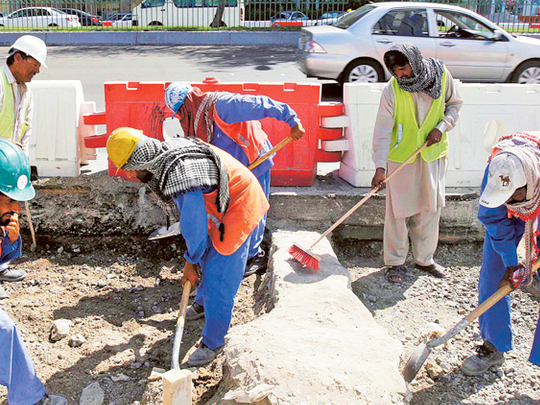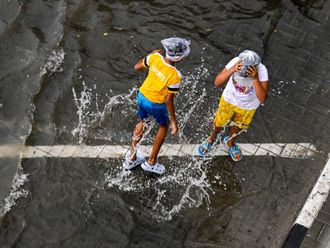
Abu Dhabi: Outdoor workers across the UAE will enjoy a three-month mandatory midday break, which will begin on June 15 and end on September 15, according to the Ministry of Labour.
The midday break aims to prevent labourers from carrying out any sort of work under direct sunlight between 12.30pm and 3pm until September 15.
The announcement was made on Tuesday by Saqr Gobash, Minister of Labour, during a press conference addressed by Mubarak Saeed Al Daheri, Undersecretary of the Ministry, alongside Maher Al Obaid, Assistant Undersecretary for the Inspection Department.
“The midday work ban has entered its tenth year now, confirming the ministry’s commitment to human and labour rights by ensuring they work in a suitable and safe environment. This is considered one of the most prominent and important initiatives, which handle preventive measures to protect workers from the risks of working under direct sunlight in extreme high temperatures,” Al Daheri pointed said.
The decision urges business owners to provide shaded areas for the workers during their break period and to completely cease work. The decision also asks the owners to adapt to eight daily working hours and compensate labourers working overtime according to the provisions of Federal Law No 8 of 1980.
The Undersecretary of the ministry warned that violators will be fined Dh15,000 if found to have forced labourers, regardless of their profession, to work under direct sunlight, “Moreover, if the issue involves a huge number of workers on the recorded work site, the company’s profile will be sent to the minister, and it might face temporary suspension from operations plus a reduction in its classification level,” he said.
The minister did note some exceptions that require continuation of work during these periods for technical reasons.
“Businesses excluded from the banned working hours include work on mixed asphalt and poured concrete if it is impossible to implement or supplement the work in one day, or carrying out work to prevent expected danger or reparation or damage or malfunction or loss, and also emergency work, including cut power lines, water supply, sewerage, electricity and cutting off or redirecting traffic or blocking public roads, in addition to cut gas or petroleum pipelines,” Al Daheri said.
Al Obaid said, “We have formed 18 teams of specialised inspectors to follow up on this particular issue, making sure that all companies are following the decision correctly. We will also conduct random visits as part of our awareness campaigns to publicise the decision and its implications and stress its importance.”












